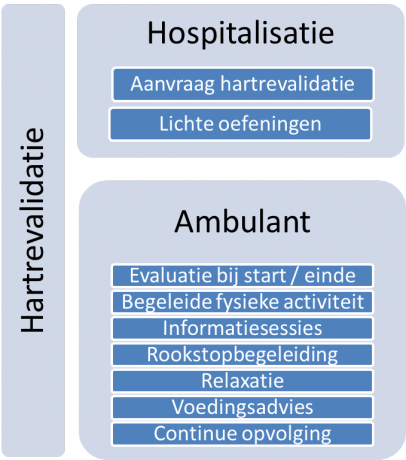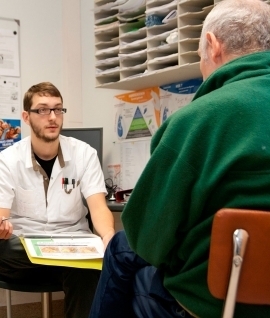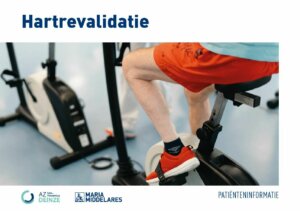Cardiac rehabilitation
What is it?
What is it?If you were admitted for coronary dysfunction, heart failure or cardiac surgery, you will be invited by the cardiologist to participate in our Heart Rehabilitation Programme. Care providers from various disciplines will treat you so that you can get back to your work and hobbies as quickly as possible.
In addition, we want to also help you with cardiac rehabilitation in order for you to adopt a healthier lifestyle and diet, to have less stress and to hopefully stop smoking. This way, you can reduce the risk of new heart problems.

Cardiac rehabilitation can be split into two phases:
1. Inpatient phase
To be able to start the Outpatient Rehabilitation Programme, an application to do so needs to be submitted during your hospital stay. The paperwork is completed by the physical therapist or social assistant who visits you in your room. Upon discharge, you will receive an appointment for the first rehabilitation session. You will already start doing light exercises in your room.
2. Outpatient phase
The Outpatient Rehabilitation Programme consists of 45 sessions, which can be organised according to your needs (within a period of six months). The Cardiac Rehabilitation Programme not only ensures an improvement of exercise capacity, but it also includes a preventative approach in relation to the risk factors.
You can avail yourself of volunteer-run transport to the rehabilitation session if you are not able or allowed to drive and you do not have anybody to drive you. The Social Services representative can help you to arrange this. With a transport certificate, you are also eligible for partial compensation from the mutual insurance fund. You may also put in a request to the Social Services.
Programme procedure
Programme procedure
Evaluation, from start to finish
At the start of outpatient rehabilitation, you will be evaluated on various dimensions so that the treatment can be customised to your needs.
The evaluation consists of:
- Ergospirometry with the cardiologist.
- Compilation of the prior medical history, medication and risk factors.
- Measurements of muscle and fat percentage, BMI and abdominal girth taken by a nutritionist.
- Quantification of quality of life using a questionniare.
- Stress test: the physical therapist will have you walk for six minutes and will document how many metres you were able to walk.
- Blood draw: in order to gain better insight into risk factors such as cholesterol.
On the basis of this evaluation, we not only can measure progress when rehabilitation ends, we can also make the necessary referrals.
Supervised physical activity
Rehabilitation sessions are principally spent doing supervised physical activity in small groups. The supervision is provided by specialised physical therapists.
Information sessions
The multidisciplinary team holds information sessions on a regular basis (three cycles of three sessions per year). All patients who are receiving cardiac rehabilitation at that time, together with their partner, will be invited. The sessions cover the following subjects:
- Medical aspects of heart disease and health diet, in theory and practice.
- Process: life after heart disease.
- Strees and coping stress.
Counselling for smoking cessation
Smoking is a very important risk factor for cardiovascular diseases. if you stop smoking, you can reduce your chance of a (new) problem with your heart or blood vessels. Giving up smoking is something that is completely within your control and has as much of an impact as the interventions that your cardiologist performs (medication or opening/dilating coronary arteries).
Giving up smoking is, however, not easy and, for that reason, you may request couseling with our tabacologist during your rehabilitation, if you like.
Relaxation
Long-term stress increases the risk of cardiac and vascular disease. Your heart has to work harder in a stress situation: the heart rate and blood pressure increase. In addition, stressful periods go hand in hand with unhealthy habits: less movement, more smoking and unhealthy eating. All of these factors have a negative effect on your cardiac and vascular diseases.
During the cardiac rehabilitation, you may participate in relaxation sessions (individual or in group). The physical therapist will give you information about these sessions during the initial evaluation.

Nutritional advice
All patients who participate in cardiac rehabiltiation will have a consult with a dietitian at the start and completion of rehabilitation. During theses sessions, the patient will be evaluated and will be given information about a healthy diet. The evaluation consists of measurement such as abdominal girth, weight, fat percentage, body mass index (BMI), etcetera. These measurements are important because poor results in this regard also mean there is an increased risk of cardiac and vascular disease.
A healthy diet and enough movement helps us maintain a healthy weight and to prevent obesity. A healthy diet is based on the active diet triangle. This model gives us an idea of what we need to do on a daily basis so that the body has all the nutrients it needs and so that we know how much we should be moving. You can find more information in the leaflet 'Healthy Diet Tips'. Not all of these tips are applicable to all cardiac patients. There are specific dietary guidelines for patients who have had heart failure.
Continuous follow-up
The evaluation at the start of rehabilitation will be discussed at the weekly team meeting in order to form a concrete action plan. In addition, advances and potential issues are discussed among all members of the multidisciplinary team during these meetings.
Maintenance phase
If desired, the patient may participate (after the normal Cardiac Rehabilitation Programme has been completed) in a maintenance programme during an evening session. This gives you a chance to combine your work with supervised physical movement.
Registration
RegistrationTo find out more or to register, contact us by telephone: 09 246 99 01.
Leaflet
LeafletSee the leaflet below for more information.
Only available in Dutch:

Hartrevalidatie
DownloadCentres and specialist areas
Centres and specialist areas
Latest publication date: 21/12/2023
Supervising author: Dr Degrande Jan, Dr Provenier Frank







